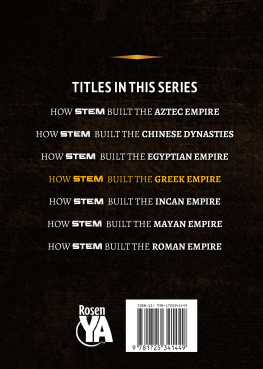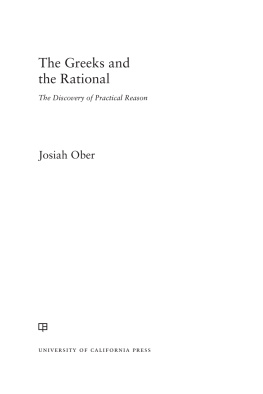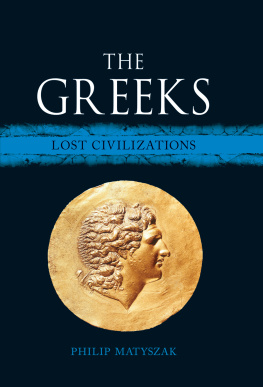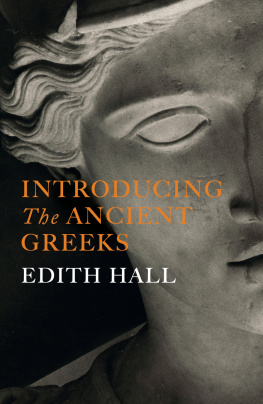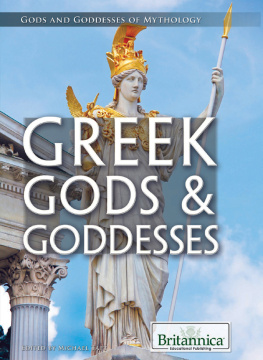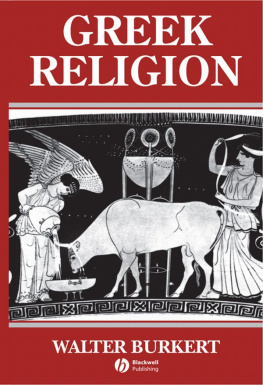Tony Mierzwicki is the author of Graeco-Egyptian Magick: Everyday Empowerment and has contributed to various anthologies and magazines. This book grew out of his research into the ancient Greek religion, which is one of the primary constituents of Graeco-Egyptian Magick.
Tony has been continuously running workshops and rituals recreating ancient magickal practices in the United States and on the east coast of Australia since 2001, drawing on his practice of ceremonial magick which he began in 1990.
Tony has completed three degrees at the University of Sydney: MA, BE, and BSc.
Born and raised in Sydney, Australia, he currently lives in Huntington Beach, California.

Llewellyn Publications
Woodbury, Minnesota
Copyright Information
Hellenismos: Practicing Greek Polytheism Today 2018 by Tony Mierzwicki.
All rights reserved. No part of this book may be used or reproduced in any matter whatsoever, including Internet usage, without written permission from Llewellyn Publications, except in the form of brief quotations embodied in critical articles and reviews.
As the purchaser of this e-book, you are granted the non-exclusive, non-transferable right to access and read the text of this e-book on screen. The text may not be otherwise reproduced, transmitted, downloaded, or recorded on any other storage device in any form or by any means.
Any unauthorized usage of the text without express written permission of the publisher is a violation of the authors copyright and is illegal and punishable by law.
First e-book edition 2018
E-book ISBN: 9780738743752
Cover design by Kevin R. Brown
Interior map by the Llewellyn Art Department
Llewellyn Publications is an imprint of Llewellyn Worldwide Ltd.
Library of Congress Cataloging-in-Publication Data (Pending)
ISBN: 978-0-7387-2593-2
Llewellyn Publications does not participate in, endorse, or have any authority or responsibility concerning private business arrangements between our authors and the public.
Any Internet references contained in this work are current at publication time, but the publisher cannot guarantee that a specific reference will continue or be maintained. Please refer to the publishers website for links to current author websites.
Llewellyn Publications
Llewellyn Worldwide Ltd.
2143 Wooddale Drive
Woodbury, MN 55125
www.llewellyn.com
Manufactured in the United States of America
Acknowledgments
Has any book ever been written in a vacuum? To a lesser or greater extent every book has multiple inputs and this book is no different.
The most important person I have to thank is Elysia Gallo of Llewellyn, who identified a need for this book and suggested that I should write it. I was receptive to the idea and embarked on a long journey of exploring what the ancient Greek religion was, how it is currently being practiced, and how beginners could immerse themselves in it while remaining true to its original spirit. Without Elysia this book would never have been written.
I would like to express my appreciation to Llewellyn for their faith in this book, Elysia Gallo for her encouragement and editing, Connie Hill for her copy editing, Donna Burch-Brown for her interior design and layout, and Kevin Brown for his cover art and design.
While writing this book I joined as many publicly accessible Hellenismos internet groups as I could find in order to develop a feel for what practitioners were doingwhat challenges they faced in their practice, the questions they had that were either answered inaccurately or were left unanswered, so I could try to address the majority of those issues in this book. I have learned something from everyone who has posted and those people with whom I discussed this book were very encouraging, while some made helpful suggestions. I am completely independent and not a member of any Hellenismos organization. As much as I would like to name those who have rendered the most assistance, I refrain from doing so as I am concerned about giving an impression of bias toward their respective organizations.
Contents
by Stephen Skinner
: Pronunciation of the Ancient Greek Language
: Greek Influence Within Contemporary Occultism
: Diet
: The Hellenic Reconstructionist and/or Polytheist Directory
FOREWORD
Tony Mierzwicki has already produced an excellent book on Graeco-Egyptian magic, so it comes as no surprise that he has now produced an excellent book on ancient Greek religion. Let me just qualify that statement: Tonys book is on the modern practice of ancient Greek religion, or even more precisely the worship of the ancient Greek gods. If your first reaction is Why would anyone want to worship the ancient Greek gods and goddesses? then pause for a moment and reflect. The Greeks and Romans were the basis of European culture. The Romans created a system of law, a network of roads, and some very beautiful architecture. But the Greeks were the foundation upon which the Romans built, and the Romans sent their children to Athens to learn philosophy, logic, rhetoric, and culture in the broadest sense. Even more to the point, the Greeks invented the only science that still survives today unchanged for 2500 years: Euclidean geometry. Neither physics, chemistry, nor botany can claim this although they too sprang from the work of a Greek, Aristotle.
For the Greeks the gods were also very important. These gods predate Christianity, Islam, Taoism, and Buddhism. Many people just think of the Greek gods as confined to the relatively small country of Greece, but since Alexander the Greats conquest of most of the known world beginning in 335 BCE, and for many centuries afterwards, the Hellenic culture he brought with him extended its influence and its language from the Mediterranean to the edge of India, including Egypt, Persia, Afganistan, Palestine, Turkey, and Syria, whilst there were significant Greek colonies in Italy and North Africa. It was not till the seventh century that Islam swept most of this influence away.
Of course, if you are a hardened atheist this book may not be for you, but the sheer beauty of their rites, their poetry, the temples they worshipped in, their statuary, much of which has never been equalled, and their sense of devotion, give us many reasons to enjoy and explore the ancient Greek gods. Many of the tales about these gods will of course be familiar from our childhood, although few schools now teach the classics. The study of the classics, of Greek and Latin, was very much a part of the school syllabus right up to the mid 1950s.
But the wonder of the child, or the aesthetic appreciation of the art and poetry these gods inspired, is only a beginning. Because of their deep roots in our culture, in our egregore (as some might say), they still exert an emotional pull. I remember one time in the early 1970s visiting Pompeii. Typically, I soon got tired of the platitudes of the guide, and set off to discover the city for myself. Turning into a narrow defile I heard the faint sound of chanting. Following the sound, I came across a hidden enclosure with a square horned altar off to one side. Leaning over it was a very serious looking bearded man with a sheep skin draped around his shoulders. I watched quietly from the shadows while he poured libations and performed other acts which I later realised were an invocation to one of the ancient gods. It was no play-acting, but for him deadly serious. It was only then that I realised that the ancient gods had not all died, or gone away, and that there were still a few people who desired their presence. Later on my way back to Naples I saw him again. He gave me a smile of recognition, but said nothing.



